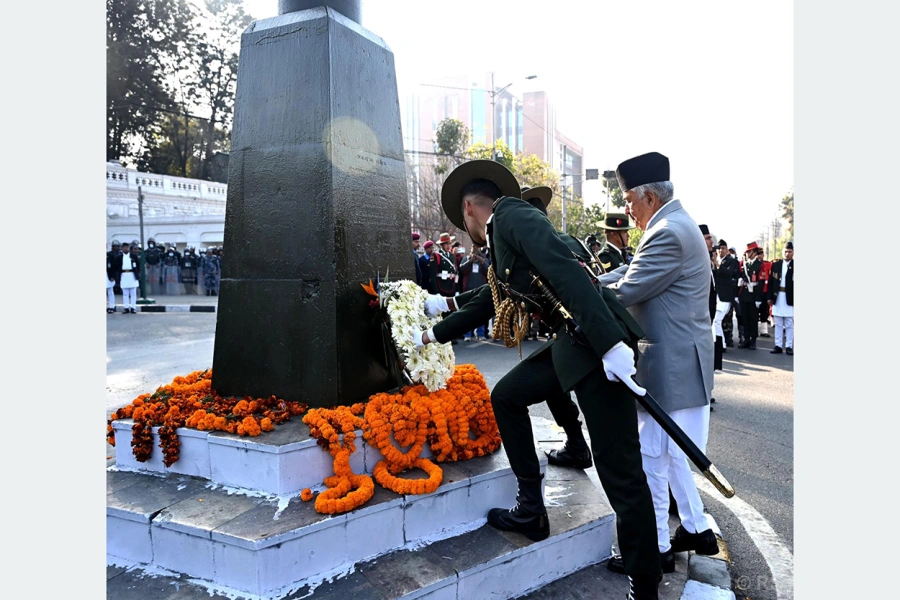Parallels can also be drawn between Dibyapodesh and Marxism in their economic visions
The unpretentious birth of a prince in the royal palace of King Narabhupal Shah of Gorkha on January 11, 1723, initially seemed like a usual royal event in the kingdom. Little did anyone know that destiny had crafted a truly extraordinary script for this young prince who was named Prithvi Narayan Shah. Ascending to the throne at the tender age of 20 years, Shah embarked on a monumental mission to unify the fragmented small kingdoms and principalities in the region, envisioning the creation of a more robust and cohesive nation. His life stands as a testament to unwavering dedication, as he wholeheartedly immersed himself in military operations, collectively recognized as the Unification Campaign. Tirelessly working towards the realization of a grand vision, his commitment extended beyond his lifetime. Following his demise, this monumental task was carried forward by his younger son, Prince Bahadur Shah, ensuring the continuity of the transformative efforts initiated by his father.
King Prithvi Narayan Shah's legacy extends far beyond the walls of Gorkha; he bestowed upon us the invaluable gift of a collective identity as Nepali citizens. His lifelong commitment to the cause remains eternally etched in history, shaping the foundation of our nationhood. Today, we owe our distinct Nepali identity to the vision and endeavors of this visionary leader. During his later days, King Prithvi Narayan Shah is said to have disseminated a series of guiding principles or divine pearls of wisdom to his progeny from his Nuwakot Palace. These timeless teachings, collectively referred to as ‘Dibyopadesh’, underscored the significance of effective governance, unity among the people, maintaining diplomatic relationships with the neighbors, and the prioritization of the welfare of the people. Through the lens of Dibyopadesh, one can glimpse into the visionary aspirations of King Prithvi Narayan Shah for the sustained governance and prosperity of the recently unified country, which are equally relevant till date.
Karl Marx and his intellectual legacy
Forty-three years after the demise of King Prithvi Narayan Shah in 1775, a pivotal moment unfolded with the birth of arguably the greatest philosopher and political theorist of the modern era, Karl Marx. Born on May 5, 1818, in Trier, Prussia (now in western Germany), Marx's intellectual legacy left an indelible mark on the course of modern history.
Kathmandu hosting int'l conference on 'Marxism and Socialism'

Karl Marx articulated theories that unraveled the dynamics of capitalism, class struggle, and socialism, with a primary focus on the intricacies of European industrial societies. His profound influence on the development of socialist and communist ideologies is exemplified in his co-authorship, alongside Friedrich Engels, of the seminal 'Communist Manifesto'.
Adding to his intellectual oeuvre, Marx's monumental three-volume work, 'Das Kapital,' meticulously delved into the intricacies of the capitalist mode of production, explored the concept of surplus value, and laid bare the inherent contradictions within the capitalist system. This magnum opus became a cornerstone of Marxist economic and political thought, shaping the discourse on societal structures and economic relations.
While Marx's principles primarily explore the dynamics of class struggle within European societies, it is noteworthy that Marxism has found substantial resonance in Nepal - a society located thousands of miles away from Europe and characterized by a distinct lack of a strictly classless structure. Indeed, Marx is held in higher esteem in Nepal than even in his birth country, Germany, and his adopted home, Great Britain. Nepali Marxist scholars have erroneously interpreted the term class as caste in Nepali context. Furthermore, those scholars often seem to intentionally overlook the reality that Marxism may not be optimally adaptable in the context of Nepal, a society characterized by its multi-ethnic and multi-cultural diversity in contrast to almost homogeneous European society.
Dibyopadesh and Marxism
In the annals of history, Dibyopadesh, disseminated in the 18th century in Nepal, and Marxism, the revolutionary ideology put forward by Karl Marx in the 19th century in Europe, might seem distant. However, a closer analysis reveals few intriguing parallels between these seemingly disparate ideologies. Therefore, Dibyapodesh holds greater relevance in Nepal compared to Marxism.
King Prithvi Narayan Shah's visionary focus was set primarily on the consolidation of diverse principalities into a unified nation. Similarly, Marxism envisions the unity of the working class to overthrow the bourgeoisie and establish a classless society. Additionally, King Shah advocated for a robust central authority to ensure stability and prevent internal divisions, aligning with Marxism's call for a strong proletarian state during its transitional phase to facilitate the eventual withering away of the state apparatus.
Parallels can also be drawn between Dibyapodesh and Marxism in their economic visions. King Prithvi Narayan Shah's teachings emphasized the economic sustainability of a unified Nepal through production, particularly in agriculture and mining. Correspondingly, Marxism reviews capitalist economic structures and promotes collective ownership of the means of production to eradicate class distinctions.
In terms of cultural integration, Dibyopadesh places significant value on Nepal's diverse cultural heritage, highlighting unity amidst diversity. It symbolizes Nepal as a garden of four castes and thirty-six ethnicities, encapsulating the essence of its rich cultural tapestry. Marxism, while recognizing cultural diversity, prioritizes the universal struggle of the working class against exploitation. Moreover, both ideologies fundamentally strive for a harmonious and equitable society, sharing a foundational commitment to social justice and equality.
While there are fundamental similarities, the essence of Dibyapodesh and Marxism diverges significantly. Marxism stands as a robust and intricate theory propounded by a political theorist par excellence, whereas Dibyopadesh consists of the words of wisdom from a king, enriched by his practical experiences. The scope and spectrum of Dibyapodesh may not be as extensive as Marxism, but its lessons hold greater relevance in the context of Nepal.
Despite the undeniable relevance of Dibyapodesh in Nepali perspective and King Prithvi Narayan Shah's monumental contribution to the unification of Nepal, Shah faced unjust demonization from individuals with socialist inclinations in Nepal, especially during the decade long violent Maoist movement and after the abolition of monarchy. Conversely, figures like Marx and other global communist leaders are held in high esteem by Nepali communists and pseudo-communists. However, akin to the unstoppable fragrance of a divine flower, the recognition of King Prithvi Narayan Shah's contributions is gradually gaining due acknowledgment in recent times. International philosophers and global personalities with extraordinary contribution towards humanity should be justifiably admired but in Nepal, the architect of Nepal's unification and the unsung philosopher, King Prithvi Narayan Shah, undoubtedly merits more recognition and appreciation than anyone else.
To conclude, although King Prithvi Narayan Shah’s divine teachings and Marxism emerged in different centuries at different geographical locations and addressed distinct challenges; the similarities in their core principles are noteworthy. Both ideologies emphasize the importance of unity, strong governance during transitional phases, economic sustainability, and a vision for a harmonious society. Recognizing these parallels provides a nuanced perspective on historical and ideological developments, underscoring the universality of certain principles in the pursuit of societal transformation.The fundamental parallels between Dibyapodesh and Marxism underscore the philosophical acumen of King Prithvi Narayan Shah and position him as a far-sighted leader preceding Karl Marx. Unfortunately, the profound philosophical and political principles upheld by King Shah failed to gain traction on the global stage, truly a big loss for humanity. On the occasion of King Prithvi Narayan Shah’s 301st birth anniversary, my heartfelt tribute to the divine personality whose vision bestowed upon us the identity of being a Nepali citizen.
The author is a senior scientist and independent opinion maker based in Germany. He can be reached at pushpa.joshi@gmail.com







































